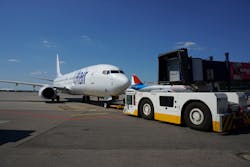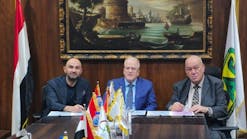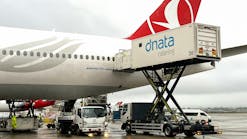Russia’s Ground Handling Sector Readies for Growth
The Russian industry of ground handling services is steadily recovering from the crisis, which was caused by the COVID-19 pandemic and its negative impact on the country’s aviation sector, according to recent statements made by some of Russia’s ground handling operators and analysts.
The pandemic led to a serious drop-off in traffic in the majority of Russia’s largest airports and a reduction in volume of the ground handling services provided.
Perhaps, the biggest decline was observed in the case of airports within the Moscow aviation hub, including Vnukovo, Sheremetyevo and Domodedovo. The airports traditionally account for the majority of air traffic in the country.
According to Alexander Vlasov, corporate affairs director of Moscow Domodedovo Airport, the reduction of flights at the airport and the closure of a number countries led to a sharp drop in passenger traffic at Domodedovo Airport in 2020 and ground handling operations.
According to him, in 2020 the overall traffic of the airport amounted to 16.4 million passengers, being significantly lower the figures of 2019 (28.3 million passengers). That, according to Vlasov, inevitably led to the decline in volume of ground handling services, provided within Domodedovo. Still, as Vlasov has also added, the situation is steadily improving this year.
“For the six months of the current year from Jan. 1 to June 30, 2021, the passenger traffic of the airport amounted to 11 million passengers. While this is by 14 percent lower than in 2019, it is by 68.8 percent higher than for the same period in 2020,” Vlasov says.
In the meantime, representatives of leading Russian ground handling operators have confirmed the pandemic has had a negative effect on the domestic ground handling sector. However, there is a possibility that the industry may almost completely recover by the end of the current year.
“Currently we see the ever growing demand for ground handling services in Russia, which is, however, primarily observed in the case of domestic operators. Of course, further dynamics will directly depend on the restrictions – or lack of them – of air traffic between the countries, and other measures aimed at combating COVID-19, that could be implemented by the Russian government,” says Pavel Kudryavtsev, an official spokesman of independent ground service provider UTG Group.
Meanwhile, in addition to pandemic issues, the concerns of operators and other market players are related with the current regulation of the domestic ground handling sector by the state. Despite the earlier announced state plans to design a new regulatory framework to ensure more efficient functioning of the industry, the final adoption of some important legislative acts is seriously delayed.
Currently the lack of regulations of ground handling sector in Russia remains still one of the major problems of the industry. That creates conditions for monopolization of the industry by selected companies, which are usually affiliated with the management of airports.
Domodedovo’s Vlasov says there is an acute need to take actions for more active de-monopolization of the Russian ground handling industry.
“To fully implement this model, the market needs unified rules that would determine the procedure for admitting third-party operators to activities at the airport, fixed unified requirements for the quality of services and clear definition of the operator's responsibility,” Vlasov says. “At the moment, Russian legislation does not contain these rules.”
In regard to Domodedovo, Vlasov says-monopolize the ground handling market.
Local regulators, however, are aware of the current criticism from operators and airports, considering ways for the tightening of a control for any monopolistic activities in the industry.
One such regulator, the Federal Anti-Monopoly Service (FAS), has recently announced its plans to start more active monitoring of tariffs, including those, which are set for ground handling services by airports and ground handling operators.
As part of this, operators will have to notify the FAS about any change of tariffs no later than 10 days in advance. The anti-monopoly agency will analyze the information justifying the change in tariffs and charges for ground handling services.
Part of the plans of authorities is also taking measures for the protection of the industry’s personnel from massive layoffs, similar to those that were observed at the end of last year when massive staff reductions were conducted by some leading local operators.
On November 2020 the Russian Ren-TV channel reported about layoffs in Sheremetyevo-Handling, an official ground handling operator of the Sheremetyevo airport.
Layoffs in the ground handling sector of Russia occurred despite the provision of almost RUB 12 billion ($163 million USD) subsidy to the domestic aviation industry by the state – in a move mitigate the consequences of the pandemic and to ensure social guarantees for industry’s workers.
The government also fears repetition of a major row in the industry, similar to those that took place at Sheremetyevo in June 2019 when, due to the lack of baggage handlers, more than 9,000 pieces of luggage were accumulated, which led to flight disruptions for passengers.
At that time, the investigation initiated by the Russian General Prosecutors’ Office led to the opening of more than 20 administrative cases and the dismissal of several managers of the airport, particularly those that were responsible for organizing ground handling operations at Sheremetyevo.
The government plans to tighten control for the technical side of ground handling services at Russian airports and their compliance with the existing Technological Schedules of Aircraft Maintenance (TGO AC) – the existing standards for the provision of such services in Russia.
In Russia, the TGO of aircraft depended on their type, with service time being established centrally. In addition, the list of operations was mandatory. In accordance with the current practice, each airport itself determines the list of operations and the time interval for servicing the initial, return and final flights by itself, based on the available capabilities and understanding of the service process. That sometimes leads to serious violations, while, as part of state plans is implementing a more strict control of operators for the observance of existing rules.
In the meantime, the rapid recovery of ground handling sector in Russia attracts an interest of some global handling operators, considering accelerating their foreign expansion.
One of such companies is Havaş, which is a ground handling subsidiary of TAV Airports Holding, a Turkish airport operation and services firm that is part of Groupe ADP.
According to S. Mete Erna, general manager of Havaş, the Russian ground handling sector is within the sphere of interests of the company.
“As the ground handling subsidiary of TAV Airports, we define our business strategy taking advantage of the potential synergies within the group. Therefore, we are currently focusing on extending our operations across the European markets where TAV is present. Consequently, we’re targeting Kazakhstan's Almaty Airport that will be an important step for us to take a place in the Russian market. We strongly believe that Russian market is highly open for expansion opportunities, as various recently developing airports in Russia can encourage global handling players through license tenders,” he says.
In the meantime, despite the pandemic, implementation of the majority of investment projects in the industry is ongoing. For example, Sheremetyevo Airport and Rossiya Airlines recently launched the modern hangar complex for ground handling and technical servicing of aircraft of the Aeroflot Group.
The commissioning of the complex became part of the long-term airport development program, while the volume of investments in the project amounted to $57 million (USD).
According to the partners, the launch of the new complex will ensure high-quality aircraft servicing including quick return flight, that will be conducted for only 25 minutes.
As part of the plans of operators is the beginning of more active introduction of some new domestic technologies in their processes, with the aim to rise the quality and efficiency of providing ground handling services.
One of such technologies has been recently developed and patented by scientists from the Institute of Applied Astronomy of the Russian Academy of Sciences and involves calculating the danger of icing of aircraft during takeoff and landing and, according to scientists, has no analogues in the world.
The new technology is based on operation of two devices - a water vapor radiometer and a temperature profiler.
According to Gennady Ilyin, head of research, in addition to achieving the main goal of increasing flight safety, the use of the new technology will ensure the rational use of formulations, which are used for the treatment of aircraft to combat icing.
As scientists have also added, chemical agents are usually used for the treatment of an aircraft in case of a threat of icing, however, according to them, there is currently no exact way to determine the need of their use. According to them, the use of such technology provides such an opportunity.





